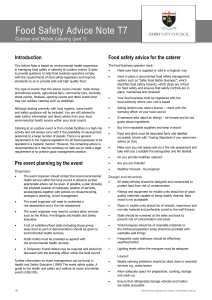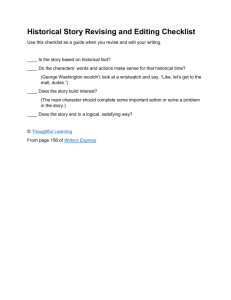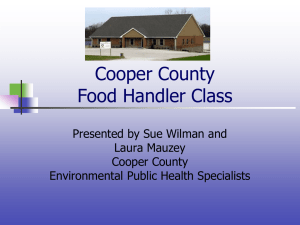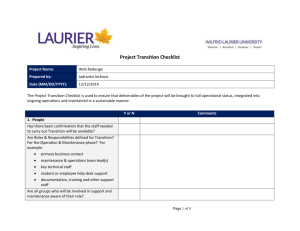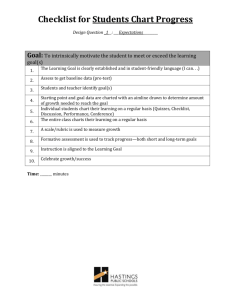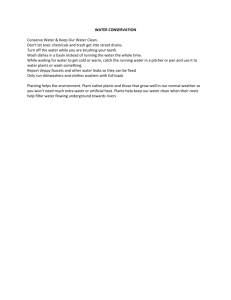Outdoor Catering Checklist: Food Safety Guidance
advertisement
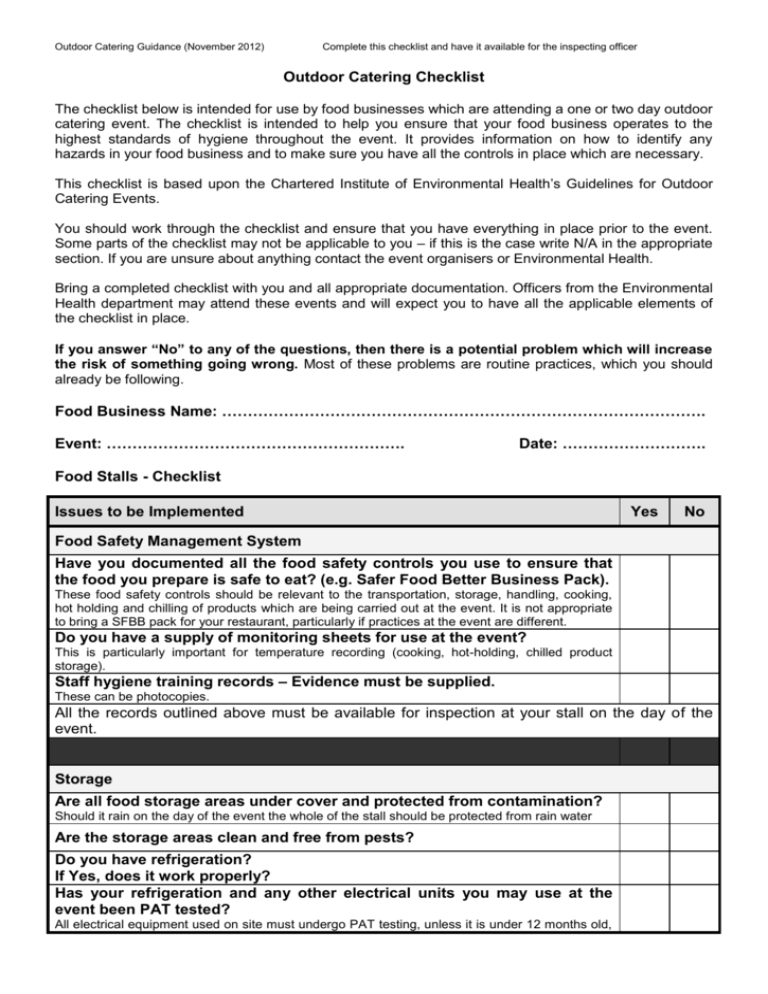
Outdoor Catering Guidance (November 2012) Complete this checklist and have it available for the inspecting officer Outdoor Catering Checklist The checklist below is intended for use by food businesses which are attending a one or two day outdoor catering event. The checklist is intended to help you ensure that your food business operates to the highest standards of hygiene throughout the event. It provides information on how to identify any hazards in your food business and to make sure you have all the controls in place which are necessary. This checklist is based upon the Chartered Institute of Environmental Health’s Guidelines for Outdoor Catering Events. You should work through the checklist and ensure that you have everything in place prior to the event. Some parts of the checklist may not be applicable to you – if this is the case write N/A in the appropriate section. If you are unsure about anything contact the event organisers or Environmental Health. Bring a completed checklist with you and all appropriate documentation. Officers from the Environmental Health department may attend these events and will expect you to have all the applicable elements of the checklist in place. If you answer “No” to any of the questions, then there is a potential problem which will increase the risk of something going wrong. Most of these problems are routine practices, which you should already be following. Food Business Name: …………………………………………………………………………………. Event: …………………………………………………. Date: ………………………. Food Stalls - Checklist Issues to be Implemented Yes No Food Safety Management System Have you documented all the food safety controls you use to ensure that the food you prepare is safe to eat? (e.g. Safer Food Better Business Pack). These food safety controls should be relevant to the transportation, storage, handling, cooking, hot holding and chilling of products which are being carried out at the event. It is not appropriate to bring a SFBB pack for your restaurant, particularly if practices at the event are different. Do you have a supply of monitoring sheets for use at the event? This is particularly important for temperature recording (cooking, hot-holding, chilled product storage). Staff hygiene training records – Evidence must be supplied. These can be photocopies. All the records outlined above must be available for inspection at your stall on the day of the event. Storage Are all food storage areas under cover and protected from contamination? Should it rain on the day of the event the whole of the stall should be protected from rain water Are the storage areas clean and free from pests? Do you have refrigeration? If Yes, does it work properly? Has your refrigeration and any other electrical units you may use at the event been PAT tested? All electrical equipment used on site must undergo PAT testing, unless it is under 12 months old, Outdoor Catering Guidance (November 2012) Complete this checklist and have it available for the inspecting officer Issues to be Implemented Yes No and you must have a certificate to prove it has been PAT tested. Food Preparation and Service Have you got enough suitable washable floor coverings for your food preparation areas? Where the event is taking place on grass, it is not acceptable to operate without some form of washable floor covering. Generally, floor covering is desirable in those areas where handling, storage or preparation is taking place. This covering should not be a hazard in itself (i.e. slips or trips). Where the event is operating on a solid flagged area, consideration will be given to allowing trade without a floor covering – contact the Environmental Health Department for confirmation. Are all worktables and preparation tables sealed or covered with an impervious, washable material (e.g. stainless steel, formica, washable table cloth) (NB: This means the surface can be wiped down and cleaned on the day. A table cloth which can be washed in a washer is not suitable, you must be able to wipe it down. Disposable paper can be used in service areas where there is no food preparation). Have you got enough preparation / worktop space for your stall to operate safely? Can cross contamination be avoided? You must be able to have complete separation between areas used for preparation of raw products (particularly meat) and those areas for preparation and handling of ready-to –eat foods. Separate tables for these functions are essential. Wash Hand Basins Wash hand basins are an essential requirement for outdoor catering events. It is expected that all food outlets should have a wash hand basin. A bucket and cold water are not acceptable, particularly for businesses handling open high risk foods and raw meat. Officers will expect to see wash hand basins at food stalls. Consideration will be given to sharing wash hand basins. If you are unsure about this matter contact either the event organiser or Bradford MDC Environmental Health (01274 437766). Have you got enough wash hand basins for the size of your stall / unit / number of staff? (NOTE: a bowl on its own is not acceptable as a wash hand basin. There must be an effective means of drainage into a waste water container from the wash hand basin). Where staff are split between raw and ready-to-eat products, ideally there should be separate wash hand basins for each area. If not, there should at least be means of disinfecting the wash hand basin after raw food handlers have used it. Are the wash hand basins supplied with hot and cold water? The water temperature must be controllable to be hand wash-safe. Wash hand basins must not share the same hot water boiler which is used for making / serving hot drinks. Do wash hand basins have suitable waste water container? An open bucket is not suitable. The waste water container should have a screw neck on which a lid can be screwed. Have you got enough supplies of liquid anti-bacterial soap to last the whole event? It is recommended that you should have at least two full bottles. Have you got sufficient supplies of paper towels for hand drying? There should be enough paper towels to last to the end of the event. Cloth hand towels are not recommended NB: The use of disposable gloves at an event does not excuse businesses from hand washing. Gloves should be changed on a regular basis and hands should be washed each time gloves are changed. Sinks Where the catering operation is taking place over a two or three day period, equipment sinks must be provided. For one day events, equipment sinks are preferable. However, where all fruit/vegetables/salads are brought in preprepared (no food washing required on site), and the amount of equipment on site is limited, it is acceptable to return equipment to your food business for cleaning. However, you must be able to demonstrate throughout that used equipment will be kept separate and not used again. In these circumstances, it will not be deemed acceptable to use the wash hand basin for cleaning. Outdoor Catering Guidance (November 2012) Complete this checklist and have it available for the inspecting officer Issues to be Implemented Have you got a sink(s) which is / are large enough to wash food and equipment in (including bulky items)? Do your sinks have their own hot and cold water supply? Wash hand basins and sinks must not share the same hot water boiler that is used for making / serving hot drinks). Does the waste water drain into a suitable container? Not an open bin or bucket. Have you got separate and suitable waste water containers? These must be clearly marked “waste water containers”. Have you got enough fresh water containers? These must be marked “fresh water only”. Are your fresh water containers clean and have they got caps on them? Fresh water containers must be disinfected using a Milton type solution and rinsed prior to use. They must also have caps on them to prevent contamination. Cleaning Is your stall/vehicle clean? Can it be kept clean during the event? Do you have a cleaning schedule to ensure all areas are clean? (Recommended – This should be relevant to the equipment being used on site and should not be the schedule for your catering kitchen, unless it is applicable to equipment being used at the event.) Have you got an ample supply of clean cloths? (Ideally these should be disposable one use only cloths e.g. paper towels) Where you are using re-usable cloths, you may need to demonstrate to the inspecting officer how you ensure cloths are not used in both raw and ready-to-eat areas i.e. demonstrate separation. Have you got an ample supply of food safe detergent, disinfectant or sanitiser and any other cleaning products that you may require to keep your business clean? These should be readily accessible on the day but stored away from the food production area. Are cleaning chemicals stored away from food? They should be. Contamination Will your food be protected from contamination at all times? You will need to demonstrate this on the day i.e. use of lidded containers, storing until needed etc. Is the unit free from pests and is open food protected from flying insects? Storage and preparation areas should be free from pests. Flying insects will be a potential problem. Minimise the amount of food on display, cover pans with lids. Food Waste Have you got proper bins with lids for food and other waste? Bins should be lined with a bin bag. Do you know where the waste collection point/s is/are on the site? You will need to determine whether you are responsible for the removal of waste or whether it is the event organiser who will provide waste disposal services. Do you have arrangements / know the arrangements for the collection and disposal of waste oil (if applicable to you)? Yes No Outdoor Catering Guidance (November 2012) Complete this checklist and have it available for the inspecting officer Issues to be Implemented Yes Staff Are all your food handlers trained, supervised and given instruction to ensure food safety? Officers will questions staff and observe practices on the day. Staff should be knowledgeable about food safety and demonstrate good food handling practices. Have your staff been given a supply of clean personal protective clothing to wear at the event? Staff must be provided with protective over-clothing. It is not acceptable for staff to handle/serve food in outdoor/everyday clothing. The food must be protected. Are your staff aware that they should not handle food if they are suffering from certain illnesses? Are they aware of the 48 hour rule? It is important that they know they sholdn’t be working if they have sickness and diarrhoea and they should not work until they have been free of symptoms for 48 hours. Do you have a first aid box with brightly coloured plasters? (Usually blue – skin tone is not acceptable). Safe Food Practices During the Event Storage Are raw and cooked foods adequately separated during storage? They must be. Are high-risk cold foods (e.g. cooked rice) stored under refrigeration below 8ºC? Have you enough fridges for all your food? It is essential you supply sufficient fridges for all your chilled food particularly if you are dealing with raw meats and ready-to-eat foods. Do you have procedures in place to ensure that the temperatures of the fridges are checked on a regular basis? The temperature should be below 8ºC and this should be recorded. Are you using freezers? If yes, specify chest freezer or trailer freezer. Will the freezers be switched on during the whole of the event They must be kept on? Preparation Do staff know when they should be washing their hands? Before preparing food, after handling raw food/rubbish/taking a break/smoking/visiting the toilet. Do you use separate chopping boards for raw and cooked foods? You must do. These must be clearly identifiable, ideally they should be colour coded. Cooking Do you have a working digital probe thermometer? You must have one on site and it must be in good, clean condition and be working. Are sanitising probe wipes available to clean and disinfect the thermometer? Is raw and frozen meat/poultry thoroughly defrosted before cooking? You must be able to explain to the officer how and where this is done. No Outdoor Catering Guidance (November 2012) Complete this checklist and have it available for the inspecting officer Issues to be Implemented Yes No Is raw meat/poultry cooked until it it piping hot (>75 ºC)? Do you check the temperature of cooked foods? You should be making periodic checks of hot food and recording those temperatures. Are cooked and part cooked foods separated during cooking? You must be able to demonstrate to the officer how you do this e.g. on your griddle etc. Re-heating Food Is all high risk food re-heated above 75 ºC? It should be and you should be recording periodic temperature checks. Do you re-heat food more than once? If you re-heat food more than once you MUST change your practices. Food should never be reheated more than once. After Cooking and Re-heating: Serving and Displaying Hot Food Is food cooked and served straight away? i.e. is food cooked to order? If no, is it kept at or above 63 ºC until it is served? If the temperature drops below 63 ºC, the food must be sold within 2 hours. Have you got checks in place to make sure you meet with the requirement? You must have some checks. If food does drop below 63 ºC, you must be able to demonstrate to an inspector that it has not been on display any longer than 2 hours at this temperature. You will need to keep a log of times and temperatures. Cleaning Is a “clean as you go” procedure in place for the event? All members of staff should be cleaning up after themselves before they move on to the next task. Are you using clean cloths and a food safe disinfectant / sanitiser to clean food contact surfaces? It is preferable that you use disposable cloths (e.g. paper towels). Where a disinfectant / sanitiser is in use, staff should be instructed in its correct use and ensure any contact times are followed. Disinfectants which smell strongly of pine or lemon or other perfumes, are not suitable – they must be food grade. Ice Will you be using ice at the event? What for? If yes, is it brought in ready-made? If no, do you make it with bottled water? You should not be using tankered water for making ice. Food Poisoning is preventable – by following the checklist and ensuring that everything is in place on the day – you can help to avoid it. Please see overleaf for additional notes for businesses attending outdoor events. Outdoor Catering Guidance (November 2012) Complete this checklist and have it available for the inspecting officer 1. Stall holders need to be clear from the outset what foods they are going to produce at the event. Do not keep changing plans and do not over-complicate things by producing lots of different foods. 2. Keep food preparation and handling to a minimum on the day. The more food preparation you can do prior to the event, the better. 3. Try to minimise the amount of raw food that is handled on site. 4. If you are bringing pre-cooked bulk foods to your stall, you must make sure that you have adequate storage facilities to keep these foods safe. 5. Bulk foods should be cooked safely, cooled down quickly (ideally within 90 minutes of cooking) and then kept cold below 8ºC right up until the point of use. 6. You must keep records to show that these foods have been cooked to a safe temperature, cooled quickly and then kept at the required chill temperature. 7. It is not recommended that hot food is transported to the event site. Hot food must be maintained at a temperature of 63 ºC or above. In practice this is very difficult to maintain when transporting food from a catering kitchen to an event venue. It is preferable that food be cooked, chilled down and then re-heated on site.
